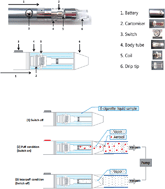Mass change tracking approach as collection guidelines for aerosol and vapor samples released during e-cigarette smoking
Abstract
As the popularity of electronic cigarettes (ECs) rises, there are growing concerns not only about the lack of a methodological basis for the quantification of various pollutants, but also the absence of proper regulations or guidelines for their production and distribution. Considering the urgent need for such guidelines, this study was carried out to explore the potent roles of key sampling variables in the quantitation of EC-produced aerosols/vapors: the sampling flow rate (or puff velocity), battery charge condition, and solution composition. All of these variables were evaluated in relation to the consumption rate of a EC solution. Accordingly, the effects of all these variables were explained very effectively when bound with the information regarding the consumption rate of the EC solution, namely the mass change tracking (MCT) approach. As such, MCT is regarded as a vital component to reduce the considerable uncertainties associated with the use of a simple criterion like pollutant mass per puff.


 Please wait while we load your content...
Please wait while we load your content...